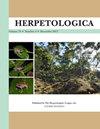Sexual Selection in San Cristóbal Lava Lizards (Microlophus bivittatus): A Test of Male Body Size Using Lizard Robots
IF 1.1
3区 生物学
Q2 ZOOLOGY
引用次数: 0
Abstract
Abstract: Intrasexual selection through male competition favoring larger male body size is the preferred explanation for the evolution and maintenance of male-biased sexual size dimorphism among polygynous species. Although sexual selection has been well studied in some groups of lizards, sexual selection in the nine species of lava lizards (Microlophus spp.) of the Galápagos has received little attention. The purpose of this research was to test the importance of male body size in the context of sexual selection by both sexes. Using three different sizes of robotic models capable of emulating the appearance and display patterns of male San Cristóbal Lava Lizards (M. bivittatus), we analyzed the responses that the models elicited among free-ranging lizards of the same sex (confrontation) and opposite sex (courtship). Results showed that body size of both male lizards and robotic antagonists influenced the number of displays performed by males. Male body size positively influenced the number of aggressive responses, scaling with the size of the opponent. The model representing larger lizards received higher display counts from males. Body size of robotic models, but not female lizards, influenced the number of displays performed by females. Females responded the most to the small and large models. Display intensity was not affected by any of the variables considered for either sex. Results from this study support the hypothesis that male-biased sexual size dimorphism in M. bivittatus is driven at least in part by both intrasexual and intersexual selection favoring larger male body size.圣克里斯托巴尔熔岩蜥蜴的性别选择:用蜥蜴机器人测试雄性体型
摘要:通过雄性竞争进行的性内选择有利于更大的雄性体型,是一夫多妻物种中雄性偏性体型二型性进化和维持的首选解释。尽管一些蜥蜴群的性选择已经得到了很好的研究,但加拉帕戈斯九种熔岩蜥蜴(Microlophus spp.)的性选择却很少受到关注。这项研究的目的是测试男性体型在两性性别选择中的重要性。使用三种不同尺寸的机器人模型,能够模拟雄性圣克里斯托巴尔熔岩蜥蜴(M.bivittatus)的外观和展示模式,我们分析了这些模型在同性(对抗)和异性(求偶)的自由放养蜥蜴中引发的反应。结果表明,雄性蜥蜴和机器人对手的体型都会影响雄性蜥蜴的展示次数。男性的体型对攻击性反应的数量有积极影响,随着对手的体型而变化。代表较大蜥蜴的模型从雄性那里获得了更高的展示数量。机器人模型的体型(而不是雌性蜥蜴)影响了雌性蜥蜴的展示数量。女性对小型和大型模特的反应最大。显示强度不受任何性别变量的影响。这项研究的结果支持了这样一种假设,即双箭M.bivittatus中偏向男性的性大小二态性至少部分是由性内和性间选择都有利于更大的男性体型所驱动的。
本文章由计算机程序翻译,如有差异,请以英文原文为准。
求助全文
约1分钟内获得全文
求助全文
来源期刊

Herpetologica
生物-动物学
CiteScore
4.60
自引率
0.00%
发文量
27
审稿时长
>12 weeks
期刊介绍:
Established in 1936, Herpetologica is a quarterly peer-reviewed journal serving herpetologists, biologists, ecologists, conservationists, researchers and the scientific community. The journal contains original research papers and essays about the biology of reptiles and amphibians, and covers many relevant topics including: behavior, conservation, ecology, genetics, morphology, physiology and taxonomy.
 求助内容:
求助内容: 应助结果提醒方式:
应助结果提醒方式:


